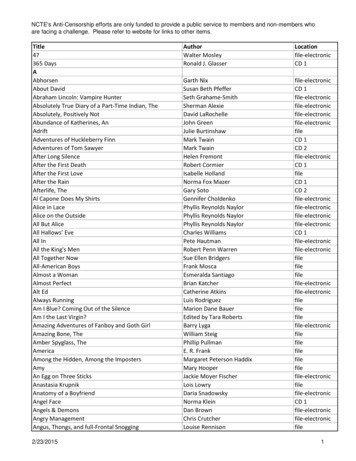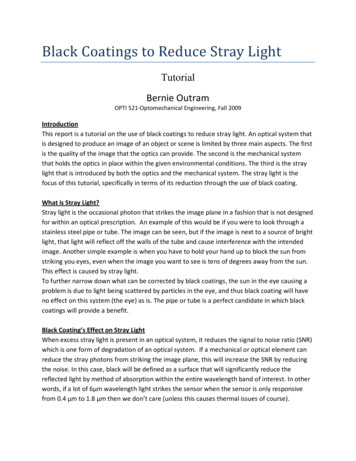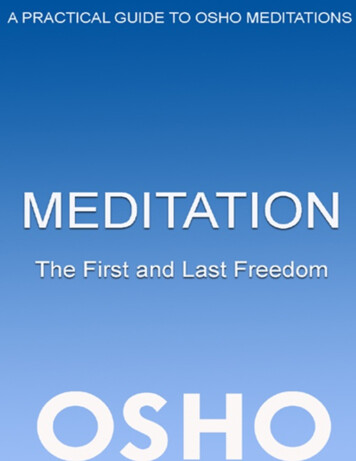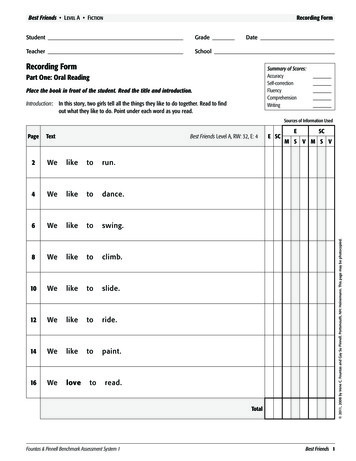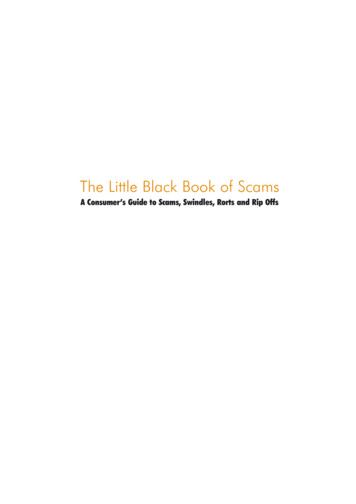
Transcription
The Little Black Book of ScamsA Consumer’s Guide to Scams, Swindles, Rorts and Rip Offs
CONTENTS2The Little Black Book of ScamsCopyright Commonwealth of Australia 2001ISBN 0 642 74075 5Published by the Department of The Treasury,Langton Crescent, Parkes ACT 2600DisclaimerWhile everything practicable has been done toensure the accuracy of information in thisbook, no liability is accepted for any loss ordamage whatsoever attributable to relianceupon any of that information. Nothing in thisbook should be taken to displace the need toseek professional advice.
ContentsScams, scammers, and youWhy scams succeedYour strategy to defeat scamsHow to deal with scams"No!"1. Pyramid schemes2. Amazing offers and demandsUninvited offers, 'prizes' andlotteriesAdvance fee fraudFalse billing3. Door-to-door scams4. Investment and financial scamsFinancial scams over the phoneMisleading share promotionsReal estate scams5. Medical scamsMiracle curesWeight loss6. Internet scamsSpamModem-jackingOnline auctions7. Self-employment scamsWhy do people get caught up in scams?You are not aloneYour contacts for helpConsumer protection 354565861646970686868
Scams, scammers, and youScamsScams are means of depriving you of your money. They give you nothingor little of value in return.Scams prey on people's desire to increase their wealth or their need forhealth, safety, or beauty. Some scams can manipulate you without youbeing aware of it. Some will offer you things you neither want nor need.Scammers play on your emotions. They are masters at the artof influence.Scams are organised by unscrupulous individuals who sometimes useinnocent and well meaning people to promote their activities. Scammersdevise new and attractive concepts to hide what they are up to, but theirschemes usually follow established steps which can give them away.You will always lose when you are caught up in a scam, yet it is so easyto take the bait. And even when scammers get caught, they've doneimmeasurable harm by the time they are caught. Then, what comfort is itto you anyway? Your money's gone. In some cases what has been lost isfar beyond monetary value. Scammers never compensate you.The scammers' perspectiveScammers try to play you for a fool. They will attempt to take you for aride, for all they can. They will strip you of what is yours. They will tryand take advantage of your good nature and instinctive behaviour.They think that there's a sucker born every minute, and they expect youto be the next one. They'll make you feel like an idiot for not goingalong with them, and they'll push you till you commit to their fraud andget-broke-quick schemes.They know that they'll get away with it in a lot of cases, that people aretoo embarrassed to report that they've been scammed.And they laugh all the way to the bank.5
How can you protect yourself?Simple.Learn to recognise scams when you come across themKnow what to do when you are approached.This is the purpose of this book. Each chapter will identify a type ofscam, explain how to recognise it and how it works and, mostimportantly, what you can do to protect yourself.Why scams succeedScams succeed because of two things.6Firstly, a scam looks like the real thing. It appears to meet your need ordesire. To find out that it is in fact a scam, you must first make theeffort to check it properly. You need to askquestions and think carefully before youdecide what to do. Depending on theissue, you could do that on the spot, oryou might need help – and it couldtake several days. This book will helpyou with that process.
Secondly, the scammers manipulate you by 'pushing your buttons' toproduce the automatic response they want. It's nothing to do with youpersonally, it's to do with the way individuals in society are wired upemotionally and socially. It's because the response is automatic thatpeople fall for the scam.To stop scammers manipulating you into their traps, it can be useful toknow how to prevent the automatic response they expect. You'll findmore on this subject on page 64.Dangerous mythsSome people have mistaken beliefs which leave them more proneto scams.One of them is the belief that all companies, businesses andorganisations are legitimate and okay because they are all vetted andapproved by the government or some other authority. That is not so.Consumer protection agencies can only do so much. While they areconstantly on the look-out for dodgy operators, they can often takeaction only after scams are reported to them. Another attitude whichmakes it easy for scammers is the belief for some people that there areshortcuts to wealth that only a few people know. This attitudeparticularly helps financial and investment fraud to take hold.There are no such secrets and experts – just successful people who havedone their homework and who got on with the job, possibly with a bit ofluck and the help of friends. You won't become one of those by signingup to some scam! There is no substitute for hard work.7
Government agencies are here to helpSpecific government agencies exist to help you protect yourself againstscams, to investigate them and to take action against perpetrators. EachState and Territory government operates a consumer protection agencyusually called Fair Trading or Consumer Affairs. The FederalGovernment operates the Australian Securities and InvestmentsCommission (ASIC) and the Australian Competition and ConsumerCommission (ACCC). You can find full contact details for these agenciesat the back of this book. Remember, it's better to call them forinformation before you fall into a scam, andbe safe, rather than to call them too late,and be broke. Money lost in scams isalmost never recovered. Even if theperpetrators are caught and punished,that is of little use to you.Get early advice and be safe.8Your strategy todefeat scamsSo you're approached overthe phone to invest in a highreturn opportunity, or you'vefound out about this newweight-loss program from afriend. It could be a scam.How do you know? Doyou take time to checkthat these offers are safeand genuine?Or
maybe you don't want to miss out, so you agree and 'just hope it'll turnout okay'.Here's whatifyouyoucan dowant to protect1 Say 'No' or hold off(refuse now – you canagree later)2 look further3 question4 decide9
How to deal with scams10
11
“NO”The best way to avoid a scam is simply to say 'No' to it.Saying 'No' is your first line of defence. Always. Even if there issomething good in the offer, say 'No' first, then seek moreinformation and independent professional advice. For importantissues, discuss the matter with someone else. If in doubt, or ifyou're alone, ask the consumer protection agency people. That'swhat they're there for.Say 'No' when you are approached. If the offer turns out to besafe and good for you, you can always say 'yes' later.N o, no t now, I n eed to th i n k a b o u t i t.N o, t hi s o f fe r s o u n d s to o go o d to b e tr u e . I w i l lse e k pro fe ssi o n a l a d v i c e .N o, I d o n' t und er s t a n d p a r ts o f th e c o n tr a c t yo uw ant me t o si g n .N o, I cho o se n o r m a l i nves t m en t s fo r my m o n ey. Ialw ays d i scuss my i nves tm en ts w i th my f a m i ly a n dmy acco unt ant b efo re s i g n i n g a ny th i n g .N o, I d o no t w a n t yo u to f i x my ro o f b efo re I g eto t he r quo t e s.N o, i t i s no t sa fe fo r m e to g i ve o u t my c red i t c a rdnum be r.N o, I d o n' t w an t yo u r 'f ree g i f ts ' a n d p r i zes .I have no busi n es s w i t h yo u .N o, I d o n' t be l i eve yo u r i nves t m en t o f fer. I f i t weret hat go o d , w hy wo u l d yo u t el l a nyo n e?N o, I d o no t need th i s i tem n ow. I a lw ay s d i s c u s spurchase s w i t h my f a m i ly.N o, I ' m t o o bus y. G i ve m e yo u r d eta i l s a n d yo u rho m e numbe r. I 'l l c a l l yo u b a c k.
Say 'No' when in doubt.Say 'No' to any offer which makes you uncomfortable, puts you underpressure or where you may be unsure or fearful. If you're frightened,shut the door on persistent door-knockers (better still, don't open yourdoor) and phone for help from a trusted neighbour or the police.Say 'No' especially when the offer seems too good to be true, tooconvenient or too easy.Say 'No' even to a friend.Say 'No', even when you know and trust the person making the offer, beit a friend or relative. Remember, plenty of innocent and well-meaningpeople have been duped into promoting scams. Both of you could standto lose money. It could also destroy your relationship.It's okay to say 'No'.It's okay to say 'No'. When in any doubt, it's safer to say 'No'. 'No' isalways your best defence. You'll enjoy the peace of mind.13
Pyramid Schemes“ Pyramidschemes fleeceyou and get you to fleeceyour friends.“14
PyramidPyramidSchemes
Pyramid SchemesPyramid SchemesPyramid schemes come under different disguises and names. Theirpurpose is to make money by recruiting people, rather than by selling alegitimate product or providing a service.Most participants never make money. Most lose all the money they paidto participate. Some have lost their life savings. Marriages andfriendships have been destroyed.What to look forI f the proposal offers you financial reward forrecruiting people and16offers goods and services of little or doubtful value, that onlyserve to promote the schemehas no goods or services for salerequires you to purchase large quantities of goods(more than what you need for yourself)then you are possibly dealing with an illegalpyramid scheme.
Promoters at the top of the pyramid profit from having people join their'money-making' scheme. They pocket the fees and other payments madeby those who join under them.In a typical pyramid scheme, a member pays to join and the only way forthe member to ever recover any money is to convince, or con, otherpeople to join up and to part with their money as well.Pyramid SchemesHow it's doneIn contrast, people in legitimate multi-level marketing make money byselling genuine products to consumers, not from the recruiting process.Be aware though, some pyramid scheme promoters disguise their truepurpose by introducing worthless products, but making money out ofrecruitment is still their main aim.People often hear about money-making schemes from friends, family orneighbours. Traditionally, pyramid schemes have used seminars, homemeetings, the phone or even mail to enrol people. Now email, usually asspam, is increasingly used as well.17
Pyramid SchemesFor everyone to profit there would have to be an endless supply ofnewcomers. In fact, the more people join up, the less they can recovertheir costs, let alone make money. When the pyramid collapses (and theyall do) relationships, friendships and marriages can be destroyed overmoney lost in the scam.In Australia, it is a criminal offence not only to promote a pyramidscheme, but even to participate in one.18Don’t sign !!Don’t sign !!I’m still notsure ?Just signhere !!!
'No, this offer sounds too good to be true. I will seekprofessional advice.'Say 'No'or hold off'No, I choose normal investments for my money. I alwaysdiscuss my investments with my family and my accountantbefore signing anything.'Pyramid SchemesHow to protect yourselfDisregard and delete all email promoting get-rich-quickfinancial schemes, chain letters or requests for cash to besent through the mail.LookfurtherRefuse to commit to anything at high-pressure meetingsor seminars. Take time to do your homework on thescheme. Think it over and seek professional orlegal advice.Check that products are able to be returned if unsold.Refuse schemes that require you to purchase moreinventory than you need.QuestionCheck with ASIC and ACCC to see if any action has beentaken against the scheme.Ask for proof when schemes publish testimonials orprojected earnings about financial achievements. Don'ttake claims of miracle products or "sure-fire sales" at facevalue. Ask for independent research or figures.DecideIf you've determined that it's not a pyramid scheme, thatdoesn't mean that it is necessarily a good opportunity foryou. Do your homework, seek independent advice andmake your decision based on the facts not on the promise.19
Amazing Offers and Demandsno such thing assomething for nothing“20“ There's
AmazingAmazing O ffersand D emands
Amazing Offers and DemandsUninvited offers, 'prizes'and lotteriesScammers will send you free goods, 'winning tickets' or invitations toentice you to go along with a scam. You might be asked to pay a joiningfee or to buy something to 'win' a prize. Some scams use the postalsystem to sell products or get money by offering something that willnever arrive.What to look forIf you receivean invitation to participate in any type of lottery or sweepstake22uninvited gifts or goods from any sourcean offer from overseasa request to pay a fee to receive more 'benefits'from the same provideran offer from an unregistered lotterythen you are probably dealingwith a scam.
Scammers send out amazing offers and 'gifts' of 'winning tickets' and'prizes' in exchange for an administration or entry fee, small enough toentice people to join. Scammers know that a number of people will sendthem money, either lured by the promise of gains greater than the initialoutlay (the 'What have I got to lose?' reaction) or because the victim isdriven by a sense of obligation after receiving 'something-for-nothing'.Amazing Offers and DemandsHow it's doneIn most cases, the victims of this type of scam pay money for somethingthey never recieve.How to protect yourself23Say 'No'or hold off'No thank you, I always refuse unexpected prizes andgifts.''No, I never give my credit card or bank account detailsto strangers.'Check with the consumer protection agency in yourState.LookfurtherQuestion how they acquired your contact details. Haveyou provided your details for a ‘free offer’ recently?QuestionDecideDon't write back. It only indicates you're interested andencourages more letters.If it is anything other than a registered lottery orcompetition – say no!
Amazing Offers and DemandsAdvance fee fraudThis scam has cost people from hundred of dollars to hundred ofthousands of dollars. The scam escalates rapidly once you showinterest – and all because there is the lure of easy money.What to look forIf you receivean offer to participate in the transfer of overseas funds (egNigeria)an unexpected request for your account details to transferoverseas funds24that's your signal that you are targeted for ascam.This doesn’t lookright to me !!!
Scammers contact you by letter (often handwritten) or by email. They tellyou that due to some misfortune in their country they have a legitimateneed to discreetly transfer large amounts of funds overseas, oftenmillions of dollars. To do that, they need access to the bank account ofsomeone who will help them and to whom they will offer a heftypercentage of their money. Of course the whole story is fictitious. And,they always emphasise the need for secrecy and urgency – to discourageyou from seeking advice.Amazing Offers and DemandsHow it's doneIf you agree and send them your details, they reply quickly with whatappears to be genuine fund transfer information, and later ask you for apayment, often thousands of dollars, to cover 'local charges' or 'bribesfor local officials'.When you send them the money you either never hear from them again,or they get back to you and ask for more. You never receive anymoney – you just lose every cent you send them.Sometimes the whole scheme is hidden under the cloak of charitable ormissionary work.How to protect yourselfSay 'No' to it. This is always a scam. There is noneed to hold off, look further, question or decide.Just say 'No'.Say 'No''No, this offer is far too dangerous.'or hold off'No, I don't give my personal or bank details to anyoneI don't know.'Report itDo yourself and literally thousands of people a favour:report the matter to the ACCC.25
Amazing Offers and DemandsFalse billingSome people and businesses assume that the bills they receive are alllegitimate, and they pay their bills in good faith. Knowing that, scammerssend out fake bills and invoices, and make money at the expense of thosewho pay bills without checking them first.What to look forIf you or your business are subjected to:unexpected bills and invoicespersistent claims that someone has already approved abilled item26unexpected items, such as advertising copy, sent to youfor approvalpeople claiming you must pay them because of a previouslysigned orderdebt-collectors pursuing you for invoices you knownothing aboutthen you might have been sent afalse bill.How it's doneScammers will bill you for things you normally purchase, and for whichyou receive invoices. The catch is, the scammers did not supply you withthe goods and services. They rely on flaws in your accounting,authorisation and payment procedures (whether you're a business or ahousehold) to lead you into making an unnecessary payment in theirfavour. Some even pretend to work for charitable organisations.
Say 'No'or hold offLookfurtherQuestion'No, I'm sorry I don't pay bills automatically, I need tocheck first'.'No, I know who authorises payments here. We onlyallow a small number of people to make those types ofpurchases'.Check the items on the bill, especially monthly creditcard statements which can include fraudulent orunauthorised transactions.Before you pay a bill check:that you did actually order the goods or services,that you did receive the goods or services, andthat they were supplied by the organisation onthe bill.Check the credentials of the organisations you dealwith, or call to check that the person who contactedyou actually works for that organisation.Ask questions – don't deal with invoices mechanically.If it doesn't check out – don't pay it.DecideAmazing Offers and DemandsHow to protect yourself27
Door – to – door Scams“ It'syour door.It's okay to close it onstrangers who turn yourhome into a market place.“28
Door – to –Door-tt o-dd oorScams
Door – to – door ScamsDoor–to–door scamsDoor-to-door scams involve promoting real or false goods or services.Even in the case of genuine businesses and products, unscrupulousoperators can still act illegally, to the detriment of other people.What to look forScammers will ask for either deposit or full payment, in cash or by creditcard. They seldom accept cheques as they can be easily cancelled later.30They will fail to tell you about your legal rights, including a 10-daycooling-off period in some states of Australia. Be aware that in NSWand Victoria, if you pay by cash or cheque, a cooling-off period does notapply. It is also important to know that not all door-to-door sales arecovered by the State or Territory door-to-door sales legislation. Somesales, such as insurance, may be covered by other legislation. Whateverthe circumstance, you should generally be made aware of your legalrights.They demand that you decide to accept their offer on the spot.In contrast, genuine door-to-door salespersons:should show personal identificationshould give you written information, and tell you about yourcooling-off period for door-to-door sales and give youdocuments which allow you to cancel the sale easilyabide by the law, call only during the legally permitted hours,and neither pressure nor require you to purchase any goodor servicegive you an official receipt with their Australian BusinessNumber (ABN), name, address and telephone details.How it's doneBesides the sale of goods, door-to-door sales can promote services, suchas a roof repair, home or garden maintenance, and telephone services.Sometimes door-knockers pretend to conduct a survey.Door-to-door sales are normally uninvited. Sometimes the salespersonjust turns up at your door, sometimes they will be in your home becauseyou booked an appointment with their sales organisation.
Door-to-door scammers will not give you value for your money. Theirmoney-back guarantees will turn out to be useless. You stand to loseyour money. At worst, a door-knocker's real purpose could be to preparefor a subsequent break-in into your home.Door – to – door ScamsIn either case, salespeople are not visitors in your home – they are thereto get you to hand over your money to them. By law they must leavewhen you tell them.31
Door – to – door ScamsExcellent. Only onemore to go and I’ve gotthe whole street!Hello Madam! I’m from the NationalChildrens Hospital Foundation. Wouldyou like to make a tax free donationso we can buy new wheelchairs?32What do you mean I can’t sendyou a cheque in a few days?What do you mean you can’tprovide indentification?
Say 'No'or hold offLookfurtherQuestion‘No, not now, I need to think about it.''No, I do not want you to fix my home until I get otherquotes.''No, I do not need this item now. I always discusspurchases with my partner [or some other 'authority'figure to fob off the salesperson].'Say 'No' to any offer which makes you uncomfortable,puts you under pressure or where you may be unsure orfearful. If you are frightened, phone for help from atrusted neighbour or the police, and consider notopening your door to people you don't know.If you suspect foul play, report the incidentimmediately to the relevant consumer protectionagency or the police.Check your emotions. Smooth or aggressive salestactics can put you under pressure. If you think thesalesperson is preying on your emotions, such as yourfear, need, curiosity, sense of obligation, then stop! Tellthe salesperson to leave.Before you sign anything, know the full costs, includingdelivery.Beware of claims such as 'your roof needs painting' or'your vacuum cleaner doesn't work properly'. Getindependent advice to check those claims.Salespeople are required to show you companyidentification. Make a written note of the person's andthe company's name, address and telephone number.Never accept door-to-door quotes at face value.Instead, seek other quotes. Compare prices and terms.Ask if there is a charge for quoting.Before you sign anything ask yourself, and ask yourfamily, whether you really need what you are beingoffered.Ask about a warranty. Get it in writing.Beware of surveys. Ask for identification. Surveys areoften a means to make an appointment for asalesperson to call. If you accept, make sure you knowthe name and address of the salesperson and of thecompany.Make sure that the decision is your own and that youare properly protected.DecideDoor – to – door ScamsHow to protect yourself33
Investments and Financial Scamsyou knew for certain away to make quickmoney, would you tellanybody?So, why would a completestranger tell you?“34“ If
Investment andInvestment a ndFinancial S cams
Investments and Financial ScamsFinancial scams over thephoneTelemarketing, in the form of cold calling, can be used to promotescams. To attract and hold the victim's curiosity, some scammers willpretend to be investment advisers or community workers from areligious organisation.What to look forIf you receive an unexpected telephone callthat36is from an unidentified or unknown source, often overseasoffers you above-average returns on your moneyencourages you to trade in foreign currencythen you could be the target of a financialscam.
Cold callers rely on human curiosity and the lure of easy money toentrap their victims. They telephone you out of the blue. They oftenclaim to be stockbrokers or portfolio managers, and play on yourcuriosity with offers of high returns for your money. Sometimes they willmake an appointment for a 'senior adviser' to call you back. Theygenerally offer share, mortgage or real estate 'investments', 'high-return'schemes, option trading or foreign currency trading. The scammers tendto operate from overseas as most of their activities are illegalin Australia.Investment and Financial ScamsHow it's doneScammers aim to make you feel like a fool if you say 'no' to them. Theyare very persistent, and people often surrender money because of thepressure placed on them. Scammers are very good at playing on emotionsand at embarrassing their target.Scammers also target people with specific religious or communityinterests, enticing them with promises to send profits to charity orworthy causes. On occasions, theperson promoting the scheme maybe acting in good faith, havingthemselves been duped by thescammers.37
Investments and Financial ScamsIf you don’t buy in this week– you’ll miss out. People aregoing crazy for this one.38
Say 'No'or hold offLookfurther'No, I only deal with people I know.''No, this offer sounds too good to be true. I will seekprofessional advice.''No, I choose normal investments for my money. Ialways discuss my investments with my family and myaccountant before signing anything.'Investment and Financial ScamsHow to protect yourselfCheck ASIC's register of authorised financialrepresentatives before you deal with unknown financialadvisers. You can check their details online atwww.fido.asic.gov.au or call ASIC.Always investigate money-making schemes verycarefully before parting with your money. Take time toseek professional or legal advice.39QuestionDecideAsk the scammers these questions and they'll probablyhang up in embarrassment:What is your Australian securities dealer's licencenumber?Who is lodging your prospectus?[If it's a foreign caller] What is your AustralianRegistered Body Number (ARBN)?What is your Australian Business Number (ABN) andyour Australian company number (ACN)?What is the name of your company? Who owns yourcompany? What is your address?If they're game enough to answer these questions, takethe time to confirm their details with ASIC.Ask for published independent substantiation ofprojected earnings, current financial statements, andprospectus. Ask for proof of testimonials offinancial success.Don't be pressured into making a decision on thephone. Make your own decision in your own time afterdoing some research.
Investments and Financial ScamsMisleading sharepromotionsYou could receive unexpected information, by email or otherwise, abouta good deal on stock you might or might not have heard of. Generallythe promotion will pretend that the stock is about to increase in value.This is known as 'ramping'.What to look forIf you receive an uninvited message from a stranger who gives you stockmarket advice or advice on a particular company's shares, you shouldsuspect a scam.40How it's doneFraudulent operators will send out millions of spam emails or letterstelling recipients that a particular stock will improve in value for somereason. The message fools gullible people who act on it. The suddendemand for the stock increases its share price. During this contrivedboom, the promoters sell the shares they had acquired previously, andmake a sizeable profit. The new owners of the stock are left with a losssince they have paid more for the shares than they are worth.Any material which promotes particular shares, promotes a vestedinterest which is not necessarily your interest. Someone else has to gainfrom the offer. Note that a company's high profile is no guarantee aboutstock information either.
Say 'No'or hold off'No, I only take advice from qualified financial advisersI know personally.''No, this tip sounds too good to be true. I will seekprofessional advice.'Investment and Financial ScamsHow to protect yourselfIf the email appears to be from a known source,contact that source to check that the email is genuine,before you take any other action.LookfurtherQuestionDecideIf you really think there's potential in uninvitedinvestment news you receive, before you take any otheraction, ALWAYS check with a qualified financialadviser authorised by ASIC. See the back for contactdetails.Don't risk any money on uninvited emails. Onlyproceed if you know the email source and havechecked the investment with a financial adviser and areinvesting only what you can afford to lose.41
Investments and Financial ScamsReal estate scamsThousands of Australians, especially people investing for theirretirement, have been ruined by two-tier marketing and other real estatescams which artificially inflate the value of investment properties anddeflate the investors' savings.What to look forBeware of all uninvited approaches to involve you in real estate deals ofany kind.If you are approached by telephone, mail or otherwise topurchase any property – particularly if that property is not inyour local area – then it’s possible you are being set up for areal estate scam such as two-tier marketing.42If you are approached to invest, alone or with others, in amortgage scheme for property away from your town, you'reprobably being set up for mortgage scam.Beware of investment seminars which promote negative gearing,mortgage schemes or other investments in real estate away from whereyou live.Promoters' claims of 'once-in-a-lifetime opportunity' and 'small windowof-opportunity' indicate you could be targeted for a scam.How it's doneTwo-tier marketing involves the selling of residential and holidayapartments, typically to interstate buyers, at prices well above fair marketrates. Investors later discover they are facing losses of tens of thousandsof dollars on their original purchase when they go to selltheir properties.Other real estate scams fleece mostly small time investors and retireesthrough solicitor-operated mortgage schemes and some negativegearing deals. They bank on you not knowing the value of real estate inthe area they are marketing.
Say 'No'or hold off'No, this offer sounds too good to be true. I will seekprofessional legal advice in these circumstances.''No, I am a careful investor. I always discuss myinvestments with my professional financial adviserbefore committing to anything.''No, I do not believe that this offer has to be acceptedwithin 24 hours. Genuine offers always allo
No, it is not safe for me to give out my credit card number. No, I don't want your 'free gifts' and prizes. I have no business with you. No, I don't believe your investment offer. If it were that good, why would you tell anyone? No, I do not need this item now. I always discuss purchases w

